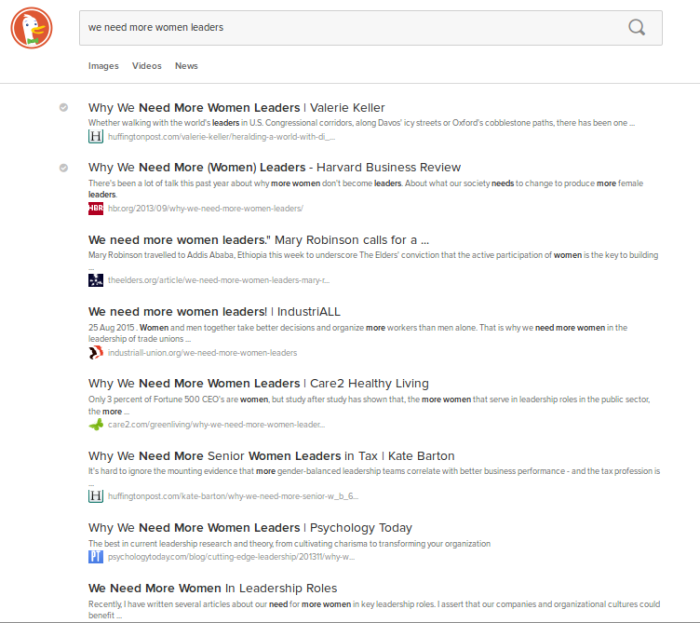Teams with members with diverse experience and skills outperform teams without diversity, as I understand research shows. My experience is consistent with that view. I am a huge fan of diversity, and, for that matter, equality.
Many people promote having more women in areas where there are fewer—in leadership, in science, technology, engineering, and math (STEM), in college, and so on. Searching on the topic on the web shows plenty of results.

The internet’s preference for promoting women in leadership becomes more stark when you search on needing more men leaders, where the top seven links promote women, not men, nor diversity.

The same happens for women in STEM. Searching on women gives plenty of results promoting women in STEM.

Searching for men shows the top results concerned about women and race, not men specifically, nor diversity or equality. That seems skewed to me because I understand that people who know and care all believe society would benefit from more people in STEM, not only one kind.

These results illustrate what I suggest will be a problem—or already is.
People respond to what you do, not what you intend when your actions differ from your intent.
If you want to increase your company’s profits but you tell them you want to increase revenues, you won’t necessarily get what you want. You’ll get what you act for. In this case your team may increase revenues, as you’ve asked, and also costs, which you said nothing about. You could lower profits. In general, misguided action can move you away from your goals.
If you want diversity and effectively act for more women, you’ll get more women, but not necessarily more diversity.
A clear example
I wrote something incorrect above on purpose—that there were fewer women in college. There used to be, but no longer—not in the U.S., nor in many other places. The USA Today reported in 2005: “College gender gap widens: 57% are women,” with the trend continuing.
I teach at NYU, whose students US News and World Report reports are 57% female, 43% male. I believe that includes the recently acquired engineering school, which has yet more male students, meaning the rest of NYU is yet more female and less diverse with regards to sex. And the engineering school is prominently striving to increase its ratio of female students.
In other words, NYU already has more women and is acting to increase its ratio and decrease its diversity with regard to sex. I’m aware of no pushes to increase its male population, despite males being the minority.
To someone who wants more women in college, this sounds great, but my understanding is that diversity improves teams, not just women, and increasing a majority to a larger majority decreases diversity. Now, it may be that women are better at things than men, but I’m not aware of any results that show it.
If you want diversity but act for more of one group, you may not get what you want.
A more stark example
I belong to a leadership committee. I’ve attended around a dozen meetings of the committee. From the first meeting I attended, I noticed the ratio was skewed so I counted the men and women.
The meetings have varied from 2:1 to 6:1. Care to guess which sex was more represented?
The answer: women have outnumbered men from double to six times as many. If we live in a world with more male leaders than female, the membership of this group is yet more skewed from the population it draws from than the general population.
In other words, this group seems to be implementing some strong biases for women and away from diversity.
This is part of the problem with the statement “We need more women leaders,” except among people who simply believe women lead better than men, even at the expense of diversity and equality.
Don’t studies show putting women in leadership positions improves performance?
I’ve read research that shows that companies with more women in leadership positions outperform those without, but all the results I’ve seen are consistent with the explanation that companies with more diversity in leadership positions outperform those without, or that the causality goes the other way. Or other explanations, like Hawthorne effects, selection effects, etc.
Personally, I understand equality and diversity help in leadership, STEM, college, etc, not one group dominating another, no matter how well-intentioned people promoting just one sex consider themselves. I’m open to evidence showing me women are better than men in these areas, or vice versa, but I haven’t seen any yet.
What this means for the future
Changing large teams takes time. Often you only see results after pushing for a long time. In such cases, you may not see results stop happening until long after you stop pushing too.
Consider if, wanting profits, you push for higher revenues in your company and it takes a long time for changes to happen. If you wait until you see revenues increase before you stop pushing and your team created extra costs with those revenues, you might not see those costs until you’ve pushed for them for a long time, however unintentionally. If it also takes a long time to reduce those costs once you notice them, they may climb for a long time after you stop pushing for your revenues, even after you start pushing to lower them.
You could decrease profits for a long time through your own actions.
That’s not the only model for society changing, but if society responds to pushing for women instead of diversity and equality the same way, we may see the ratio already present in colleges and at least on leadership committee continue move away from diversity and equality.
You might say if we want equality and diversity we have to push for more women. Even so, our language and actions matter. Instead of saying “We need more women leaders” we could say things that explicitly promote what we want, not something tangential, like “Diversity in leadership positions improves outcomes” or “Equal representations of sexes improve outcomes”.
The lesson I learned:
The lesson this perspective teaches me is:
Know what you want and what you act for. Be aware of your words and actions.
I find leadership works most effectively when based in awareness. Without awareness, you can easily act against your interests without realizing it.
